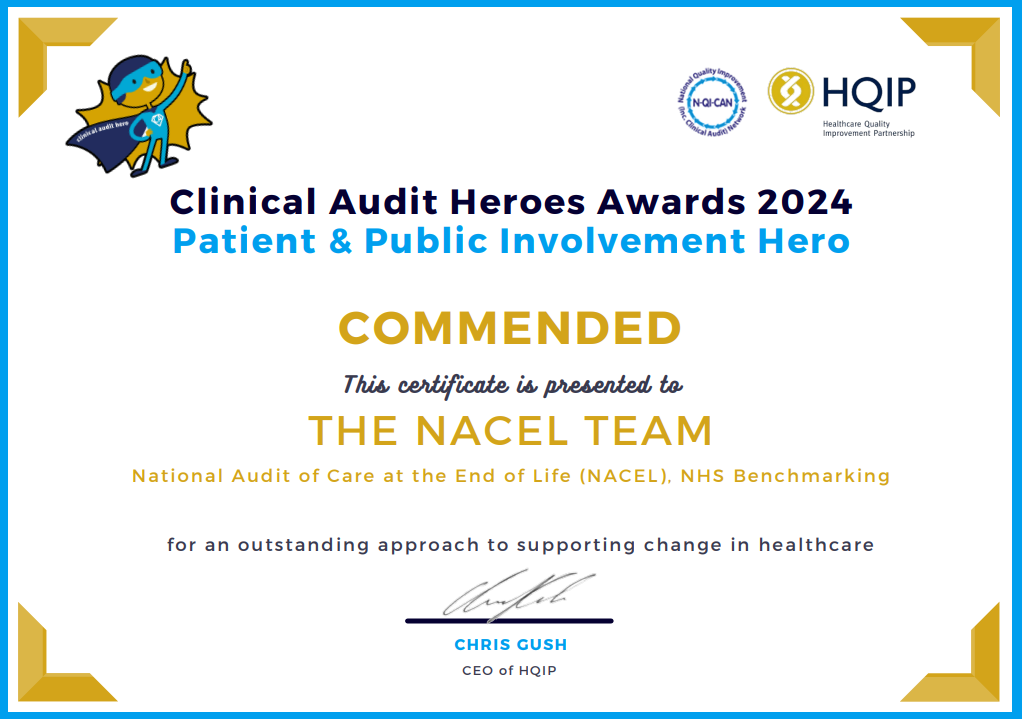End of Life Clinical Audit Celebrated in National Awards
National Audit of Care at the End of Life (NACEL) is in the spotlight this week, as part of a national campaign to underline the importance of clinical audit and quality improvement in enhancing patient care. They have been announced as a commended entry in the Patient & Public Involvement category of the Clinical Audit Heroes awards, which are an integral part of Clinical Audit Awareness Week.
They were recognised for a project which directly sought the views and experiences of bereaved people in the design of an audit tool. The judges were impressed, not only with the support available to patients and carers, but also the on-going process of feedback. There was involvement from the very beginning, and this was clear from the impact demonstrated.
Jessica Moss, Quality Improvement Lead for NACEL at the NHS Benchmarking Network, said: “We are delighted to be recognised in the Clinical Audit Heroes awards. By taking an evidence-informed approach to improvement, clinical audits help to target change where it will have the greatest impact. Thank you to all the participants in the bereaved persons focus groups for sharing their experiences as well as The Patients Association (@PatientsAssoc) and Nikki Archer for collaborating with us on this project.”
Clinical Audit Awareness Week is hosted by the Healthcare Quality Improvement Partnership (HQIP) in collaboration with the quality improvement network N-QI-CAN, and runs from 24-28 June 2024. It is designed to celebrate the role of clinical audit and quality improvement in improving healthcare services.
More specifically, clinical audits review and measure healthcare, often in relation to local and national standards and targets. They are an effective way to determine if services are performing as they should and, if not, identify where changes are needed. They also help healthcare providers and patients alike to understand how their service is performing, and where improvements could be made. As such, the work of clinical audit teams is essential, both as drivers of improvement in their own organisations and in supporting scrutiny of our health system at a national level.
Chris Gush, CEO of HQIP, explains: “Without clinical audit, we would lack the necessary insights to understand what is working well and, crucially, what is not. By measuring our healthcare services and tracking the differences that improvement activities make, clinical audits are directly contributing to saving and improving patients’ lives.”
For more information on the national clinical audits that are commissioned by HQIP on behalf of NHS England, go to www.hqip.org.uk/national-programmes; to see their findings, view the reports published on a wide range of clinical disciplines, ranging from asthma and diabetes to cancer and cardiovascular disease.
Find out more about Clinical Audit Awareness Week and the Clinical Audit Heroes awards on the HQIP website.
You can also join in the celebrations on social media using #CAAW24.
NB: HQIP is an independent organisation that works in partnership with patients and healthcare professionals to influence and improve healthcare, through clinical audit and evidence-informed quality improvement. They commission the National Clinical Audit and Patient Outcomes Programme (NCAPOP) on behalf of NHS England.
Clinical Audit Awareness Week is a national campaign spearheaded by Healthcare Quality Improvement Partnership (HQIP) and the National Quality Improvement (including Clinical Audit) Network (N-QI-CAN). More information is available at: www.hqip.org.uk/clinical-audit-awareness-week. The social media hashtag is #CAAW24.
Enquiries: communications@hqip.org.uk.


